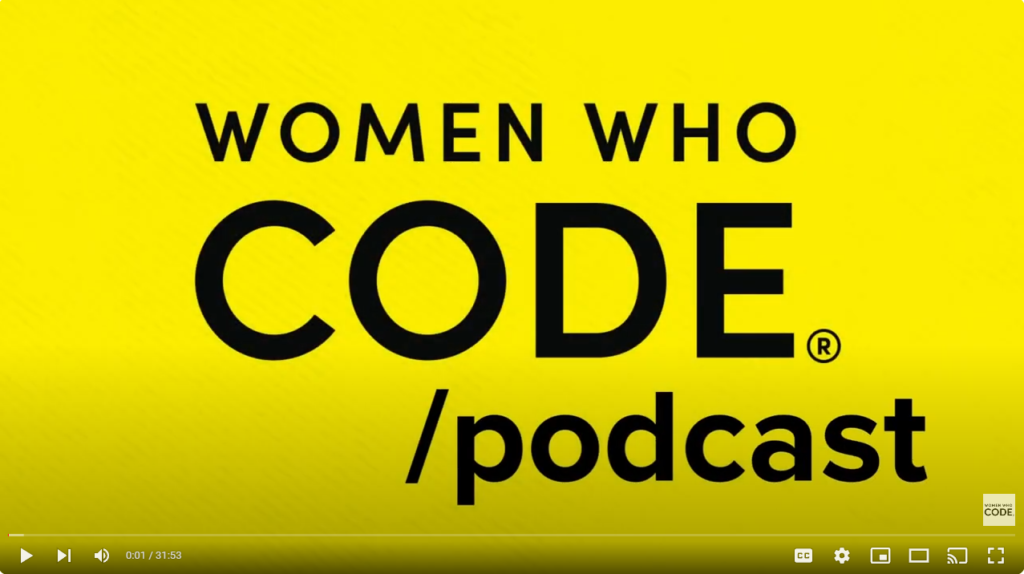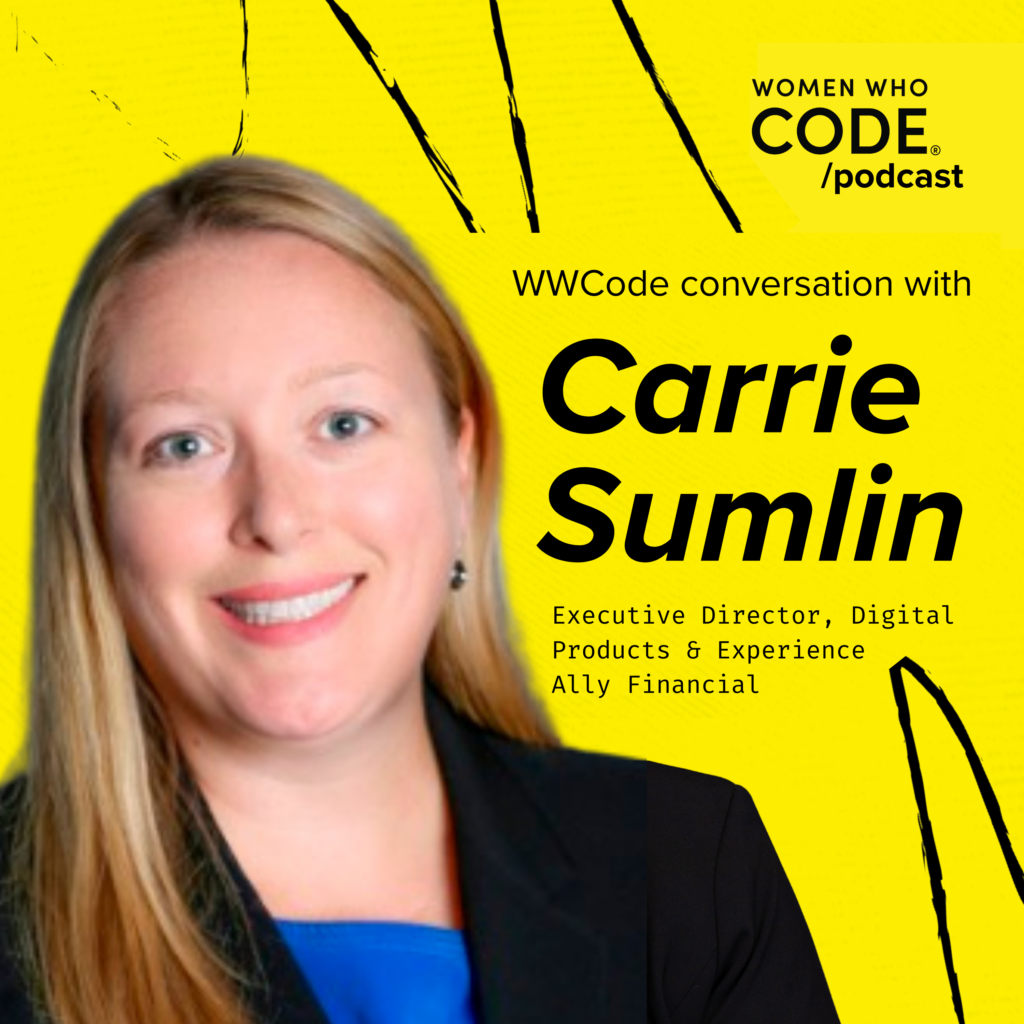Conversations #95: Carrie Sumlin, Ally Deposits Online and Mobile Executive
Written by WWC Team

iTunes – Spotify – Google – Video – More Episodes
Sandy Welfare, Chief Development Officer at Women Who Code, sits down with Carrie Sumlin, Ally Deposits Online and Mobile Executive at Ally Financial. They discuss Ally’s company culture and their commitment to diversity and inclusion. They also talk about Ally’s support for Carrie in her leadership journey.
Tell us about your career journey, where you started, and, more importantly, where you are now.
I graduated from UNC-Chapel Hill. I was selected for an early talent role within First Union’s Technology department from our campus recruiting process. Wells Fargo had acquired First Union National Bank. I interviewed for a role within the IT Strategy Group and got that role. It was an interesting place to start your career in a strategy position when you don’t know much about what you’re strategizing for. It was good for me in terms of my day-to-day work, getting a view of the whole picture, how it fits together, what the different departments of a tech company or bank look like, and how those tech departments in the bank fit together.
From there, I was fortunate enough to pivot into their newly formed e-channels or e-commerce groups. That was on the cusp of when the world was starting to embrace internet technology and looking at how we use the internet to make money, reduce expenses, and generate engagement.
Being part of that group was my first opportunity to sit down and think about the value we can add to consumers in the internet browser when they’re used to going in and talking to a banker. That’s where it all began: thinking about using technology and experiences to solve business and customer problems.
Everything has now moved to mobile. Are you concerned about security?
Security is always an issue, and it’s the entry ticket. We cannot create solutions that don’t offer customer information protection and strong security. On mobile, leveraging those native features and functions helps keep our customers safe and secure and gives us additive layers of security as customers authenticate.
At the same time, these devices have gone to market. We’ve been able to do it in a way that doesn’t create too much friction for our customers. With authentication, we’re always trying to figure out the right experience that isn’t such a high bar that you can never get into your account because you can never remember your password or get your device to work. Data security is where we start. It’s critically important, and the foundation of everything we create starts and ends there for us.
What does your day-to-day look like?
I’m focused on employee engagement. How do we get the most from our teams, how do we give them the most, and how do we create an environment and a culture where they feel empowered and can deliver the solutions to our customers in the best possible way? I also spend a lot of time looking over the customer experience itself. I do a lot of reviews of what our design experience is going to be and then how we are doing against some of our major strategic initiatives.
Are we on track? Do we have issues, concerns, risks, and things we must work through to deliver for our customers successfully? I occasionally think about our future strategies where we have gaps and where there is white space in the marketplace. Where can we leverage technology in a way we haven’t yet thought about how to continue to position us as a leading digital bank in the US? The other important thing is staying in sync with all the partners across the organization.
I also find myself being extremely motivated by our customers and thinking about what else they need and how we win. One of the things I’ve done for the 15 years I’ve been here is read what we call the voice of the customer. When our customers have something to say to us, they tell us exactly how they think and feel. It informs me of where people are, what works well, and what’s not. That’s a major passion of mine, and that is something I do every single day.
How do you make customer service work in the digital banking space across multiple generations?
We see the different generations engaging with us differently and in different frequencies, but one of our fastest growing populations, for example, in our mobile banking engagement, are older generations. Millennials have been there in high percentages all along. We are seeing older generations starting to move to the phone as well. From a strategy perspective, we’ve always approached it to create a lot of simplicity in how we talk about financial services to customers. We speak in clear and simple terms. It still resonates with you even if you’re experienced in banking with a particular device or interaction. That allows us to target everybody with that simple messaging.
Tech is constantly iterating and growing. How do you embrace the changes?
We’re never there, there’s no destination, it is a journey, it is constant, continuous change. Setting a tone within my team and feeling energized by that is important. Otherwise, it would be very exhausting. Creating opportunities for people to provide feedback, generate their ideas, pivot our process, and pivot our technology, not making a decision and feeling like you have to stick to that forever or fight for it like a death match. We can evolve, we can change, and we can make different decisions. We can make mistakes, and creating an environment where we can do that and that makes us better, not worse, is critical.
Regarding emerging technologies, do you see that some of the pivots you’ll need to make will be around artificial intelligence?
It feels very similar to the momentum we felt when the internet came out, and we said, how do we commercialize this, and how do we provide experiences? AI has been around for a long time, but there have been clear advancements in generative AI over the last six months in a way that’s become very public and accessible for folks.
We have to think about how to create experiences for customers that are different and more meaningful. Being able to test and learn into that extremely safely, in a way that data is protected. We must think through those things, be on top of, and create a culture where that’s important and a good thing to do. Otherwise, we won’t be here in the long term. Those are the things in our fiber that we must get excited about. AI has the potential to be game-changing.
How has Ally supported your growth as a leader?
Ally does a great job at growing leaders. I have benefited from that, and many other leaders have benefited from that as well. Fundamentally, Ally is a very flat organization. There are not many layers from top to bottom, and that creates a lot of opportunities for our associates to create a lot of opportunities for me to have exposure and experience, to hear and see things across our executive team.
It helps me understand how that works and what I need to do and think through and present to be effective. Ally is also very empowering because of its nature and culture. There’s not a territorial component. If something needs to happen, step in and do it. Fill in the white space. Being in an organization that lets you fill that in has nurtured my ability to grow and to lead. I’ve had great leaders that I’ve worked for over time. A few years ago, Ally gave me an executive coach. It was life-changing.
What does Ally’s company culture look like?
Culture is really important at Ally. It’s something that everybody who works here is very proud of, and people are very proud to be allies. We’re proud to work here. We wear our purple T-shirts out a lot. It started with our brand transformation in 2009 when we moved from GMAC to Ally. Our brand pillars were to talk straight, do right, and improve. Those are still fundamentally what we do in the 14 years since we did that. It’s how we want to talk to our customers. It’s how we show up for our associates.
I think a lot of that culture for Ally also comes through how we want to interact in the community.
What is Ally’s take on diversity, equity, and inclusion?
We strongly focus on our ERGs and creating communities within our associate base. Our Chief Information, Data, and Digital Officer, Sathish Muthukrishnan, came in a few years ago and established two additional groups. BBIT stands for Black and Brown In Tech, and WIT is Women In Tech. We have a tremendous opportunity to create more representation in technology – as the tech industry’s population does not generally mirror the US population. There is so much talent to unlock, and by providing a forum and focusing on black and brown in tech and women in tech, we make our company better.
What would you say in terms of the alignment of values for Ally and yourself?
This isn’t a value that Ally necessarily talks about in this term, but a value that I hold is fairness. I believe that, fundamentally, what we do is fair. I think fair bleeds into equality, a word we use. I believe very strongly in honesty. I also believe in loyalty.
What are you passionate about outside of work?
I am very passionate about soccer. My kids are both involved in competitive soccer. I have a 13-year-old seventh grader and a 17-year-old senior in high school, both of whom play soccer. Because of all the soccer I’ve been watching for the last eight years through their journeys, I’m now a fan of professional soccer.
What would you share with other women about what they need to do to pivot or seek to be an executive?
Be confident. Women seem to suffer more than men from lack of confidence. Be authentic. Don’t compromise who you are and what you believe in. Don’t feel like you ever have to do that. You don’t want to sit at a table where you’re not allowed to be who you are. Be self-aware. It’s always important to know what you do well and what you don’t.
Understanding what you don’t do well is probably the most important. Don’t talk to talk. When you decide to say something, say it in as few words as possible so when you say something, it’s meaningful. Be responsive. It all starts with relationships. Be deliberate in how you manage them. Those relationships are the foundation at the executive level for getting work done.
If you were to converse with your 18-year-old self, what would you share with your 18-year-old self?
I would tell her to have a little more fun. I was fairly serious along the way. I would also say be bolder and braver.
***************
Video: https://youtu.be/tcYFOYu3Y6Y
Host: Sandy Welfare, Chief Development Officer at Women Who Code
Guest: Carrie Sumlin, Ally Deposits Online and Mobile Executive at Ally Financial
Producer: Kimberly Jacobs, Senior Communications Manager @ Women Who Code
